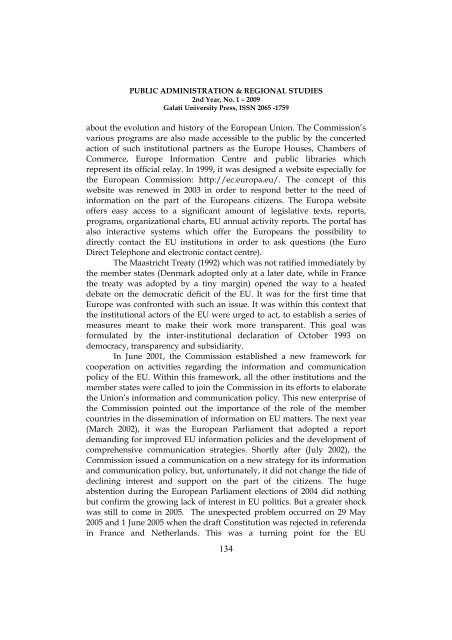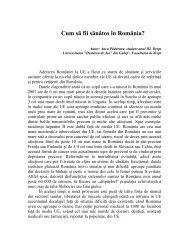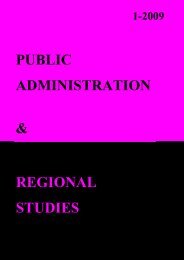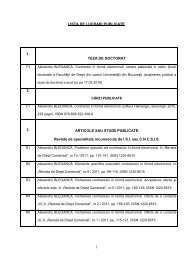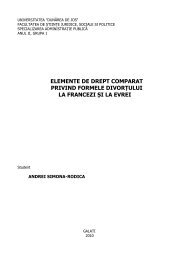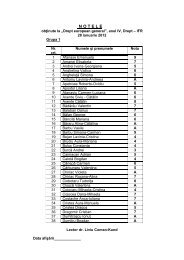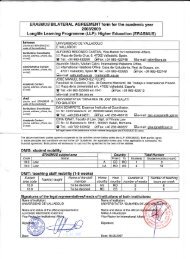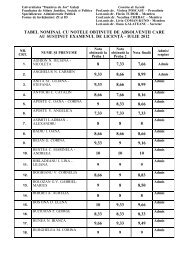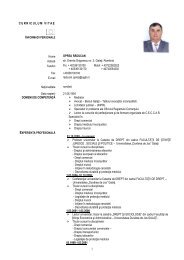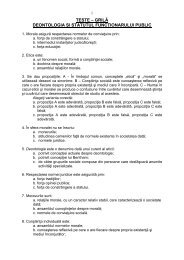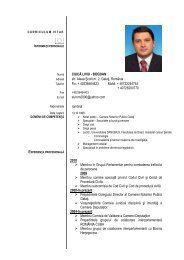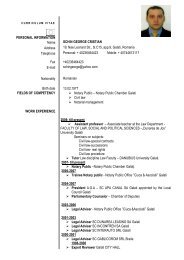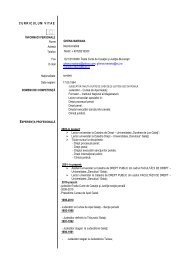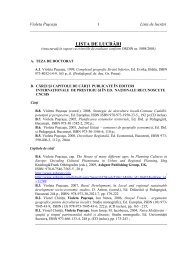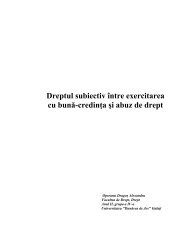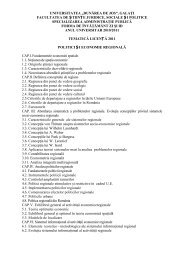regional studies public administration - Facultatea de Drept ...
regional studies public administration - Facultatea de Drept ...
regional studies public administration - Facultatea de Drept ...
You also want an ePaper? Increase the reach of your titles
YUMPU automatically turns print PDFs into web optimized ePapers that Google loves.
PUBLIC ADMINISTRATION & REGIONAL STUDIES<br />
2nd Year, No. 1 – 2009<br />
Galati University Press, ISSN 2065 -1759<br />
about the evolution and history of the European Union. The Commission’s<br />
various programs are also ma<strong>de</strong> accessible to the <strong>public</strong> by the concerted<br />
action of such institutional partners as the Europe Houses, Chambers of<br />
Commerce, Europe Information Centre and <strong>public</strong> libraries which<br />
represent its official relay. In 1999, it was <strong>de</strong>signed a website especially for<br />
the European Commission: http://ec.europa.eu/. The concept of this<br />
website was renewed in 2003 in or<strong>de</strong>r to respond better to the need of<br />
information on the part of the Europeans citizens. The Europa website<br />
offers easy access to a significant amount of legislative texts, reports,<br />
programs, organizational charts, EU annual activity reports. The portal has<br />
also interactive systems which offer the Europeans the possibility to<br />
directly contact the EU institutions in or<strong>de</strong>r to ask questions (the Euro<br />
Direct Telephone and electronic contact centre).<br />
The Maastricht Treaty (1992) which was not ratified immediately by<br />
the member states (Denmark adopted only at a later date, while in France<br />
the treaty was adopted by a tiny margin) opened the way to a heated<br />
<strong>de</strong>bate on the <strong>de</strong>mocratic <strong>de</strong>ficit of the EU. It was for the first time that<br />
Europe was confronted with such an issue. It was within this context that<br />
the institutional actors of the EU were urged to act, to establish a series of<br />
measures meant to make their work more transparent. This goal was<br />
formulated by the inter-institutional <strong>de</strong>claration of October 1993 on<br />
<strong>de</strong>mocracy, transparency and subsidiarity.<br />
In June 2001, the Commission established a new framework for<br />
cooperation on activities regarding the information and communication<br />
policy of the EU. Within this framework, all the other institutions and the<br />
member states were called to join the Commission in its efforts to elaborate<br />
the Union’s information and communication policy. This new enterprise of<br />
the Commission pointed out the importance of the role of the member<br />
countries in the dissemination of information on EU matters. The next year<br />
(March 2002), it was the European Parliament that adopted a report<br />
<strong>de</strong>manding for improved EU information policies and the <strong>de</strong>velopment of<br />
comprehensive communication strategies. Shortly after (July 2002), the<br />
Commission issued a communication on a new strategy for its information<br />
and communication policy, but, unfortunately, it did not change the ti<strong>de</strong> of<br />
<strong>de</strong>clining interest and support on the part of the citizens. The huge<br />
abstention during the European Parliament elections of 2004 did nothing<br />
but confirm the growing lack of interest in EU politics. But a greater shock<br />
was still to come in 2005. The unexpected problem occurred on 29 May<br />
2005 and 1 June 2005 when the draft Constitution was rejected in referenda<br />
in France and Netherlands. This was a turning point for the EU<br />
134


